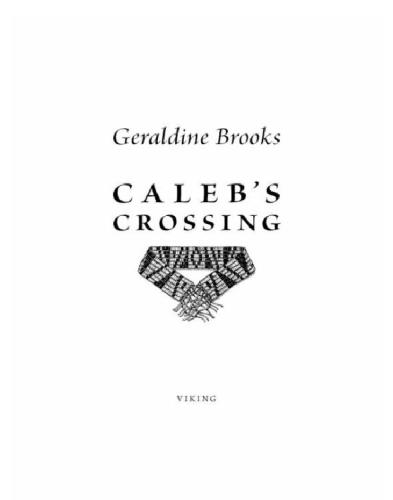
Caleb's Crossing
A Novel
کتاب های مرتبط
- اطلاعات
- نقد و بررسی
- دیدگاه کاربران
نقد و بررسی

March 14, 2011
Pulitzer Prizeâwinner Brooks (for March) delivers a splendid historical inspired by Caleb Cheeshahteaumauck, the first Native American to graduate from Harvard. Brooks brings the 1660s to life with evocative period detail, intriguing characters, and a compelling story narrated by Bethia Mayfield, the outspoken daughter of a Calvinist preacher. While exploring the island now known as Martha's Vineyard, Bethia meets Caleb, a Wampanoag native to the island, and they become close, clandestine friends. After Caleb loses most of his family to smallpox, he begins to study under the tutelage of Bethia's father. Since Bethia isn't allowed to pursue education herself, she eavesdrops on Caleb's and her own brother's lessons. Caleb is a gifted scholar who eventually travels, along with Bethia's brother, to Cambridge to continue his education. Bethia tags along and her descriptions of 17th-century Cambridge and Harvard are as entertaining as they are enlightening (Harvard was founded by Puritans to educate the "English and Indian youth of this country," for instance). With Harvard expected to graduate a second Martha's Vineyard Wampanoag Indian this year, almost three and a half centuries after Caleb, the novel's publication is particularly timely.

April 15, 2011
The NBA-winning Australian-born, now New England author (People of the Book, 2008, etc.) moves ever deeper into the American past.
Her fourth novel's announced subject is the eponymous Caleb Cheeshahteaumauk, a member of the Wampanoag Indian tribe that inhabits Massachusetts's Great Harbor (a part of Martha's Vineyard), and the first Native American who will graduate from Harvard College (in 1665). Even as a boy, Caleb is a paragon of sharp intelligence, proud bearing and manly charm, as we learn from the somewhat breathless testimony of Bethia Mayfield, who grows up in Great Harbor where her father, a compassionate and unprejudiced preacher, oversees friendly relations between white settlers and the placid Wampanoag. The story Bethia unfolds is a compelling one, focused primarily on her own experiences as an indentured servant to a schoolmaster who prepares promising students for Harvard; a tense relationship with her priggish, inflexible elder brother Makepeace; and her emotional bond of friendship with the occasionally distant and suspicious Caleb, who, in this novel's most serious misstep, isn't really the subject of his own story. Fascinating period details and a steadily expanding plot, which eventually encompasses King Philip's War, inevitable tensions between Puritan whites and upwardly mobile "salvages," as well as the compromises unavoidably ahead for Bethia, help to modulate a narrative voice that sometimes teeters too uncomfortably close to romantic cliché. Both Bethia, whose womanhood precludes her right to seek formal education, and the stoical Caleb are very nearly too good to be true. However, Brooks' knowledgeable command of the energies and conflicts of the period, and particularly her descriptions of the reverence for learning that animates the little world of Harvard and attracts her characters' keenest longings, carries a persuasive and quite moving emotional charge.
While no masterpiece, this work nevertheless contributes in good measure to the current and very welcome revitalization of the historical novel.
(COPYRIGHT (2011) KIRKUS REVIEWS/NIELSEN BUSINESS MEDIA, INC. ALL RIGHTS RESERVED.)

Starred review from March 15, 2011
In 1965, Caleb Cheeshahteaumuck of Martha's Vineyard graduated from Harvard, whose 1650 charter describes its mission as "the education of the English and Indian youth of this country." That much is fact. That Caleb befriended Bethia Mayfield, the free-spirited daughter of the island's preacher, is of course fiction--but it's luscious fiction in the capable hands of Pulitzer Prize winner Brooks (March). As one might expect from Brooks, Bethia is a keen and rebellious lass, indignant that she should be kept from book learning when her slower brother gets the benefit of an education. She first encounters Caleb in the woods, learning his language and ways while stoutly arguing her Christian beliefs; later, Bethia's zealous father brings Caleb into the household to convert him. And so begins Caleb's crossing, first from Native to English Colonial culture and then from the island to Cambridge, where he studies at a preparatory school before entering Harvard. Bethia ends up at the school, too--but as an indentured servant. VERDICT Writing in Bethia's voice, Brooks offers a lyric and elevated narrative that effectively replicates the language of the era; she takes on the obvious issues of white arrogance, cultural difference, and the debased role of women without settling into jeremiad. The result is sweet and aching. Highly recommended. [Prepub Alert, 11/15/10.]--Barbara Hoffert, Library Journal
Copyright 2011 Library Journal, LLC Used with permission.

Starred review from March 15, 2011
Brooks, winner of the Pulitzer Prize for her Civil War novel, March (2006), here imagines the life of Caleb Cheeshahteaumauk, the first Native American to graduate from Harvard. The story is told by Bethia Mayfield, the daughter of a preacher who traveled from England to Marthas Vineyard to try and bring Christ to the Indians. In 1660, when Bethia is 12, the family takes Caleb, a Wampanoag Indian, into their home to prepare him for boarding school. Bethia is a bright scholar herself, and though education for women is discouraged, she absorbs the lessons taught to Caleb and her brother Makepeace like a sponge. She struggles through the deaths of her mother, a younger sister, another brother, and her father. When Caleb and Makepeace are sent to Cambridge, Bethia accompanies them as an indentured servant to a professor. She marries a Harvard scholar, journeys with him to Padua, and finally returns to her beloved island. In flashbacks, Brooks relates the woes of the Indian Wars, the smallpox epidemic, and Calebs untimely death shortly after his graduation with honors. Brooks has an uncanny ability to reconstruct each moment of the history she so thoroughly researched in stunningly lyrical prose, and her characters are to be cherished.(Reprinted with permission of Booklist, copyright 2011, American Library Association.)

























دیدگاه کاربران